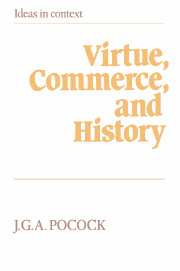 Virtue, Commerce, and History
Virtue, Commerce, and History Book contents
- Frontmatter
- Contents
- 1 Introduction: The state of the art
- PART I
- PART II
- 5 Modes of political and historical time in early eighteenth-century England
- 6 The mobility of property and the rise of eighteenth-century sociology
- 7 Hume and the American Revolution: The dying thoughts of a North Briton
- 8 Gibbon's Decline and Fall and the world view of the Late Enlightenment
- 9 Josiah Tucker on Burke, Locke, and Price: A study in the varieties of eighteenth-century conservatism
- 10 The political economy of Burke's analysis of the French Revolution
- PART III
- Index
5 - Modes of political and historical time in early eighteenth-century England
Published online by Cambridge University Press: 05 May 2010
- Frontmatter
- Contents
- 1 Introduction: The state of the art
- PART I
- PART II
- 5 Modes of political and historical time in early eighteenth-century England
- 6 The mobility of property and the rise of eighteenth-century sociology
- 7 Hume and the American Revolution: The dying thoughts of a North Briton
- 8 Gibbon's Decline and Fall and the world view of the Late Enlightenment
- 9 Josiah Tucker on Burke, Locke, and Price: A study in the varieties of eighteenth-century conservatism
- 10 The political economy of Burke's analysis of the French Revolution
- PART III
- Index
Summary
History – in all but a few, rather esoteric, senses of the term – is public time. That is, it is time experienced by the individual as public being, conscious of a framework of public institutions in and through which events, processes and changes happened to the society of which he perceives himself to be part.
The public realm, unlike the social realm, must be conceived as institutionalized and formalized, since otherwise the distinction between public and private cannot be maintained; and the institutionalization of the public realm leads to the institutionalization of social experience and of modes of apprehending it, and consequently to the institutionalization and differentiation of apprehended time. To say that “history is public time,” therefore, is to say that individuals who see themselves as public beings see society as organized into and by a number of frameworks, both institutional and conceptual, in and through which they apprehend things as happening to society and themselves, and which provide them with means of differentiating and organizing the things they apprehend as happening. This is why the archaic dictum that “history is past politics” has more to be said for it than we are disposed to recognize, and why the history of historiography is to so large an extent part of the history of political discourse.
- Type
- Chapter
- Information
- Virtue, Commerce, and HistoryEssays on Political Thought and History, Chiefly in the Eighteenth Century, pp. 91 - 102Publisher: Cambridge University PressPrint publication year: 1985
- 4
- Cited by
